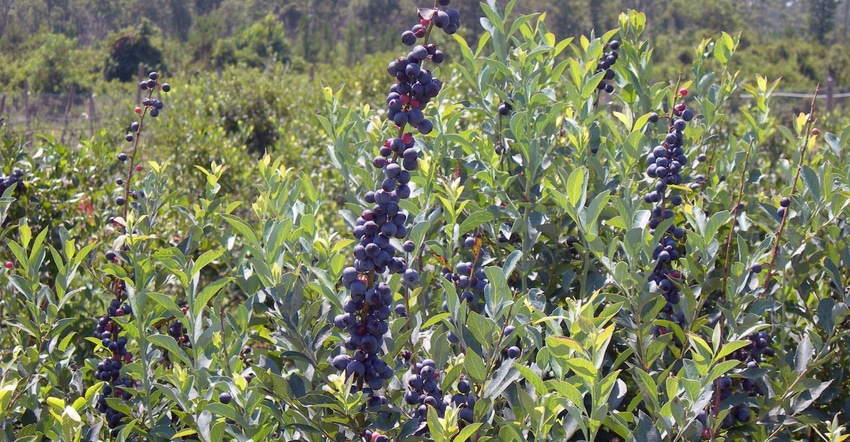
The U.S. International Trade Commission on Feb. 11 ruled that imported blueberries aren’t causing substantial injury to U.S. producers. “As a result, the investigation will end, and the commission will not recommend a remedy to the president,” the ITC states in a brief statement.
The “Section 201” investigation was requested last year by the U.S. Trade Representative. The top U.S. blueberry imports are from Canada, Chile, Mexico and Peru. Under the U.S.-Mexico-Canada agreement, both Canada and Mexico have the ability to immediate impose retaliatory duties equal to the amount imposed by the United States.
The American Farm Bureau Federation released a statement following the ruling that it was disappointed that the International Trade Commission failed to recognize the damage certain imports are doing to America’s hardworking farmers.
“Seasonal fruit and vegetable farmers face unfair competition from foreign growers and today’s decision demonstrates that much work still needs to be done to address international trade imbalances,” says Zippy Duvall, AFBF president. “Increases in lower-priced fresh, chilled and frozen blueberries during seasonal harvest times in the U.S. leads to lower prices for domestic growers. Since domestic farmers are price-takers, not price-makers, they need time to adjust their operations to the increased import levels.”
A broad coalition of industry groups, elected officials, and state agricultural leaders submitted letters of support for the ITC’s investigation into the serious injury caused by surging imports of foreign blueberries, according to the American Blueberry Growers Alliance.
“Conducting this investigation is important to assess the full scope of the impact of these imports on domestic producers,” according to a Feb. 3 letter co-signed my Sen. Debbie Stabenow, D-Mich., chairwoman of the U.S. Senate Agriculture Committee, and Sen. Gary Peters, D-Mich. “It is vital to maintain a domestic blueberry industry in the United States so that American families are not dependent on foreign imports for our food supply.”
In a letter submitted to the ITC on Feb. 5, the National Farmers Union noted that growers’ operating returns fell 32.4% between 2015 and 2019 because of rising imports. “The significant surge of low-priced blueberry imports in the last several years, coupled with the timing of these imports during U.S. harvesting periods, has had a devastating effect on U.S. blueberry growers, processors, and the rural communities where they live and work,” says Rob Larew, president of NFU, which represents approximately 200,000 family farmers and ranchers across the United States. “The concerns of farmers whose markets are negative impacted by imports – and the data that supports those claims – must be taken seriously.”
The Florida Farm Bureau Federation, Georgia Farm Bureau and Georgia Fruit & Vegetable Growers Association also sent letters to the ITC, highlighting the far-reaching consequences of the swell in blueberry imports into the United States, including for American consumers. “Not only do these imports threaten domestic businesses and livelihoods, they also expose U.S. consumers to products from countries with poor or inconsistent product safety records,” says John Hoblick, president of the 136,000-member Florida Farm Bureau Federation.
Further, in a recent letter signed by 21 industry groups, Bill Bullard, CEO of R-CALF USA, urged the Commission to recognize the serious injury affecting domestic blueberry growers, adding: “Blueberry growers deserve a chance to sell their goods in the United States at reasonable prices and deserve the breathing space of effective safeguard relief to make the necessary adjustments to sustain a secure domestic supply of blueberries.”
These supportive statements follow similar remarks made to the ITC during a January 12 hearing where several members of Congress testified in support of American blueberry growers, including U.S. Reps. Austin Scott, R-Ga., Bill Huizenga, R-Mich., Earl L. “Buddy” Carter, R-Ga., Gregory Steube, R-Fla. and John Rutherford, R-Fla., as well as Georgia Commissioner of Agriculture Gary Black and Florida Department of Agriculture and Consumer Services Commissioner Nicole Fried.
Duvall adds, “We will continue to work with USDA, USTR and the Department of Commerce to find meaningful assistance for our domestic blueberry industry and to ensure America’s farmers are paid a fair price for the food they grow.”
About the Author(s)
You May Also Like






